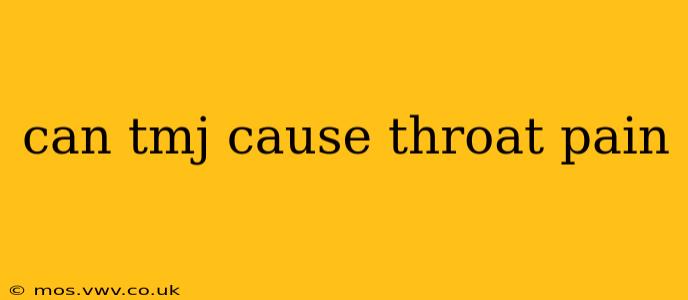Temporomandibular joint (TMJ) disorder, or TMJ, affects the jaw joint and the muscles controlling jaw movement. While jaw pain is the most common symptom, many individuals experience pain radiating to other areas, including the throat. This raises the important question: can TMJ cause throat pain? The answer is a qualified yes. While not a direct, causal relationship in every case, there's a strong correlation and several mechanisms that explain how TMJ issues can lead to throat discomfort.
How Can TMJ Lead to Throat Pain?
The connection between TMJ and throat pain isn't always straightforward, but several factors can contribute:
1. Muscle Referrals: The Primary Culprit
The muscles responsible for jaw movement (masseter, temporalis, medial pterygoid) are closely intertwined with muscles in the neck and throat. When these jaw muscles are strained, inflamed, or experiencing spasms due to TMJ, the pain can "refer" to other areas. This means the pain originates in the jaw but is felt in the throat due to shared nerve pathways. This is a common mechanism in referred pain, where the brain misinterprets the signal's origin.
2. Nerve Irritation: A Complex Pathway
The trigeminal nerve, a major cranial nerve, innervates both the jaw muscles and the throat. Inflammation or irritation of this nerve due to TMJ can trigger pain in both locations. This nerve irritation can stem from muscle spasms, joint dysfunction, or even disc displacement within the TMJ.
3. Postural Issues: An Indirect Connection
TMJ problems can sometimes lead to poor posture. This, in turn, can strain the muscles of the neck and throat, causing additional pain and discomfort. The body compensates for jaw misalignment by subtly altering its posture, leading to muscle imbalances and pain in seemingly unrelated areas.
4. Myofascial Pain Syndrome: A Broader Perspective
TMJ is often associated with myofascial pain syndrome (MPS), a chronic pain condition affecting the muscles and fascia (connective tissue). MPS can affect multiple areas, including the jaw, neck, and throat, creating a complex pattern of pain and discomfort.
Frequently Asked Questions (FAQs)
Here are some frequently asked questions related to TMJ and throat pain:
What are the symptoms of TMJ besides throat pain?
Besides throat pain, other common TMJ symptoms include jaw pain and tenderness, clicking or popping sounds in the jaw joint, difficulty chewing or opening the mouth wide, headaches (especially those that start in the temples), earaches, and facial pain.
How is TMJ-related throat pain diagnosed?
Diagnosing TMJ-related throat pain requires a thorough examination by a healthcare professional, usually a dentist specializing in TMJ disorders or an oral surgeon. They'll assess your jaw joint's range of motion, palpate the jaw muscles for tenderness, and review your medical history. Imaging tests, such as X-rays or MRI, may be necessary to rule out other conditions.
What are the treatment options for TMJ-related throat pain?
Treatment focuses on managing the underlying TMJ disorder. This may include:
- Pain relievers: Over-the-counter medications like ibuprofen or naproxen can help manage pain and inflammation.
- Muscle relaxants: Prescribed muscle relaxants can help alleviate muscle spasms.
- Physical therapy: Exercises and stretches can improve jaw mobility and strengthen surrounding muscles.
- Splints or mouthguards: These devices help reposition the jaw joint and reduce strain on the muscles.
- Injections: Corticosteroid injections can reduce inflammation in the joint.
- Surgery: In severe cases, surgery may be necessary, but it is usually a last resort.
Can TMJ cause difficulty swallowing?
While not a direct symptom, the muscle tension and pain associated with TMJ can sometimes indirectly affect swallowing. The discomfort in the throat and surrounding muscles may make swallowing feel difficult or painful.
How long does TMJ-related throat pain last?
The duration of TMJ-related throat pain varies depending on the severity of the TMJ disorder and the effectiveness of treatment. It can range from a few days to several months or even longer.
By understanding the connection between TMJ and throat pain, individuals can seek appropriate medical attention and effective management strategies to alleviate their discomfort. Remember, consulting a healthcare professional is crucial for accurate diagnosis and personalized treatment.
